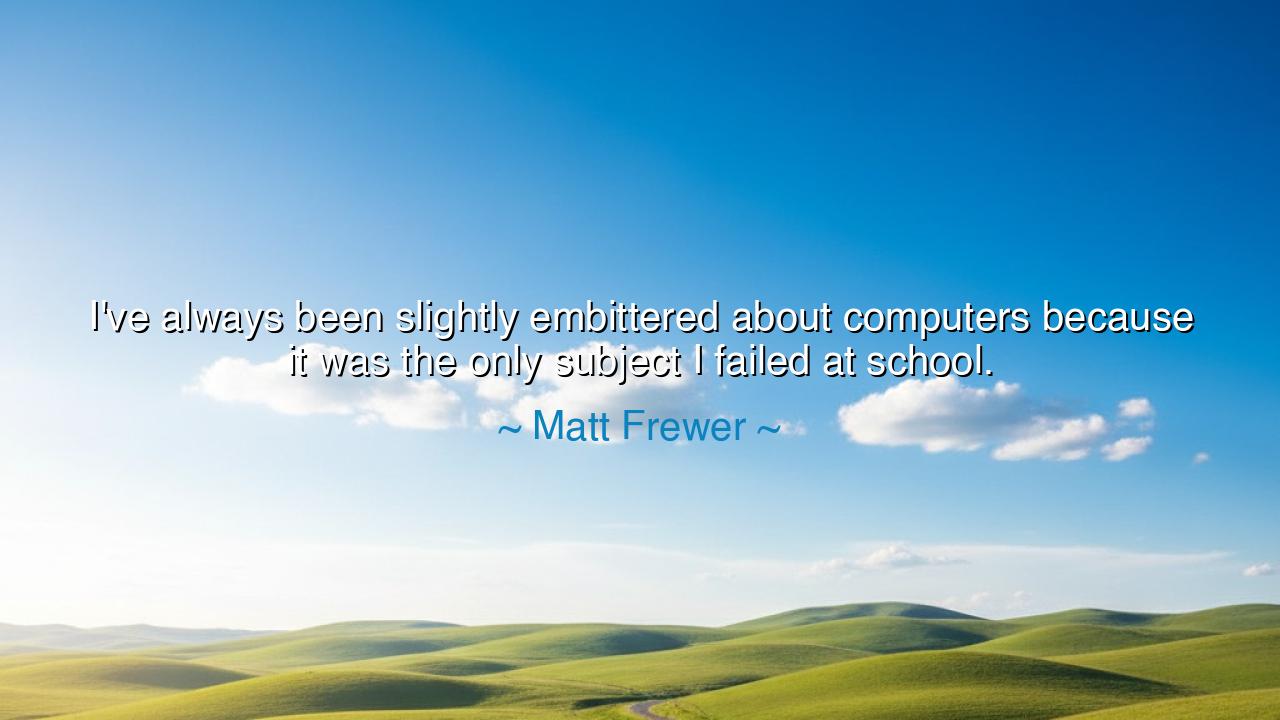
I've always been slightly embittered about computers because it
I've always been slightly embittered about computers because it was the only subject I failed at school.






The actor and philosopher of wit, Matt Frewer, once confessed with humor and humility: “I’ve always been slightly embittered about computers because it was the only subject I failed at school.” Though his words may seem light, even playful, they carry within them the universal sting of human imperfection—the pain of failure, the pride of learning, and the subtle rivalry between man and machine. Frewer, known to the world as the face of Max Headroom, the world’s first fictional computer-generated TV host, uttered this with irony, for he became an icon of the very technology that once defeated him. His quote, therefore, is not merely about a subject in school—it is a meditation on fallibility, destiny, and the strange dance between what we resist and what we become.
In the ancient tongue, his confession would be a parable: that sometimes the forces we fail to master in youth are those that shape our destiny in maturity. Frewer’s bitterness toward computers was born of defeat, yet it was that same technology that later made him immortal in the annals of popular culture. It is as though the gods of irony themselves had woven a lesson into his life: that failure is not the end, but the foundation of transformation. He who stumbled before the machine became its living symbol, bridging the divide between the mechanical and the human. Thus, in the theater of fate, failure becomes the first act of mastery.
This truth is as old as civilization. Consider the story of Thomas Edison, who was dismissed by his teachers as “too stupid to learn anything.” Yet it was Edison who, through countless failures, lit the modern world with his inventions. He once said, “I have not failed. I’ve just found 10,000 ways that won’t work.” Like Frewer, he turned defeat into wisdom, weakness into strength. So too did Albert Einstein, who failed an entrance exam to a prestigious school before reshaping humanity’s understanding of time itself. Failure, then, is not a verdict—it is a forge, where the spirit is tested, tempered, and reborn.
When Frewer says he is “embittered,” we hear not resentment alone, but the echo of every human who has struggled against the unknown. The computer, in his story, becomes more than a machine—it is the symbol of the intellect’s frontier, the challenge that humbles even the brightest minds. To fail before it is to face the limits of one’s understanding. Yet, to speak of that failure with humor is to triumph over it. For humor, as the ancients knew, is the mark of the wise. It is the laughter that follows enlightenment, the peace that comes after pride has been shattered and rebuilt as humility.
Frewer’s journey mirrors the paradox of human progress itself. For centuries, humankind has built tools to expand its power, only to be daunted by its own creations. The machine has always been both servant and master, mirror and challenge. The craftsman of bronze once feared the furnace; the sailor of old once trembled before the compass. So too do we now wrestle with our computers, our algorithms, our inventions that outpace our understanding. Frewer’s playful bitterness reminds us that it is human to struggle with what we create—and divine to laugh at our struggle.
The lesson, then, is this: do not despise your failures, for they are the gates of your becoming. What defeats you today may define you tomorrow. Approach your shortcomings not with bitterness, but with curiosity. Turn resentment into reflection, frustration into learning. The wise do not curse the mountain for being steep—they climb it, knowing that each stumble is a step toward mastery. And if you must fail, fail boldly, with heart and humor, for even in failure lies the seed of triumph.
So, children of this restless age, remember Matt Frewer’s ironic wisdom. The things that humble you are the things that will shape you. Do not fear the unknown, whether it is a computer, a craft, or a calling. Embrace it, wrestle with it, even fail before it—for the soul that dares to fail dares to grow. And when you stand upon the mountain of your learning, look back and smile, as Frewer did, at the irony of it all. For life, in its divine comedy, often leads us to greatness through the very doors we once believed were closed.






AAdministratorAdministrator
Welcome, honored guests. Please leave a comment, we will respond soon